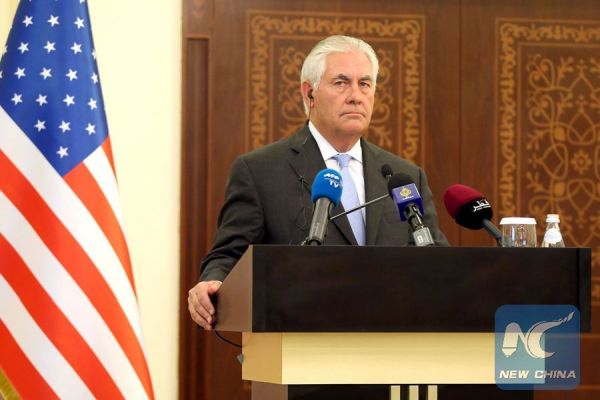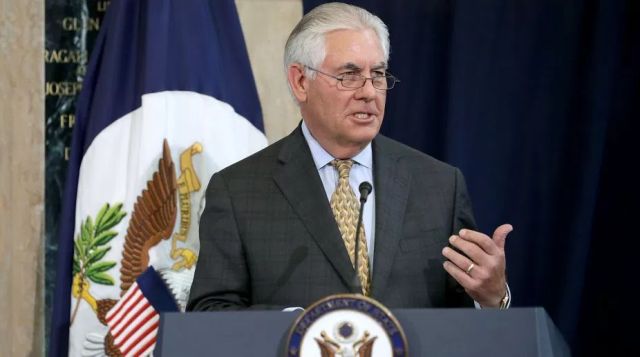
by admin | May 25, 2021 | Muslim World

US Secretary of State Rex Tillerson
Kabul : US Secretary of State Rex Tillerson made a brief, unannounced visit to Kabul on Monday, and reaffirmed the US’ commitment to working with the Afghan government and partners in the region to achieve peace in Afghanistan and “deny safe havens to terrorists who threaten that goal”.
Tillerson’s visit, ahead of his visit to Doha, Qatar, and Pakistan, was shrouded in secrecy and comes amid a spike in Taliban violence in the country, that has claimed around 200 lives in the past week.
Tillerson, who was in Kabul for just over two hours, met President Ashraf Ghani, CEO Abdullah Abdullah and National Security Advisor Hanif Atmar. He then departed for Doha.
According to a US Embassy statement, Secretary Tillerson and President Ghani met in Kabul and together reaffirmed the US-Afghan commitment to achieving peace, stability and long-term prosperity in Afghanistan.
“The Secretary stated that the new US strategy for South Asia makes clear the United States’ commitment to working with the government of Afghanistan and with partners across the region to achieve peace in Afghanistan and deny safe havens to terrorists who threaten that goal. President Ghani reiterated his support for the new US strategy and emphasized his government’s commitment to reforms aimed at ensuring the safety, security and well-being of all Afghans.”
According to a government source, the discussions centered around counterterrorism, the new US strategy in Afghanistan, the peace process and bilateral relations, Tolo News reported.
Tillerson’s visit came as Afghanistan’s National Directorate of Security (NDS) announced that a key Haqqani member suspected of being behind a number of suicide attacks in parts of Afghanistan, especially Kabul city, has been arrested in Kabul.
The suspect, named Mawlawi Bashir, is an important member of Haqqani and is believed to have ties with the Taliban, the NDS said.
A source from the NDS said Bashir also had ties with Pakistan’s intelligence agency, ISI, and is suspected of having been involved in a number of deadly attacks in the last 12 years in Afghanistan, Tolo News reported.
According to the NDS, Bashir was also involved in getting suicide bombers into Kabul city.
He is also believed to have been involved in explosions, bombings and kidnappings of Afghan businessmen and foreigners. Bashir reportedly had sanctuaries in Logar and Maidan Wardak.
In related news, the CIA has decided to send in small, experienced teams to Afghanistan to hunt down Taliban commanders – a move that has been welcomed by the Afghan government.
The Afghan Ministry of Defence (MoD) on Monday welcomed the move by the United States’ Central Intelligence Agency (CIA) to ramp up efforts to target Taliban leaders and commanders in Afghanistan, Tolo reported.
The top US commander in Afghanistan General John Nicholson has said based on the new US strategy for Afghanistan, not only will the pressure be increased on insurgents, but the countries that support them will also come under serious pressure.
The CIA’s move comes on the heels of a spate of deadly attacks around the country, especially in the cities, which have killed over 200 civilians and military personnel.
Tillerson is on a five-nation tour and will hold discussions with high-ranking officials in Pakistan on Tuesday.
From Pakistan, Tillerson goes to India.
President Trump outlined a revamped strategy for Afghanistan in August, with measures including more troops, lifting restrictions on commanders in the field imposed by the Obama administration, and increasing pressure on Pakistan to stop providing a safe haven to militant groups along its border.
—IANS

by admin | May 25, 2021 | Muslim World, News, Politics, World

Rex Tillerson
By Aroonim Bhuyan,
New Delhi : Prior to his maiden visit to India in his official capacity, US Secretary of State Rex Tillerson has made clear Washington’s position on key geopolitical and strategic matters pertaining to the Indo-Pacific and South Asian regions, saying the “Trump administration is determined to dramatically deepen ways for the United States and India” to further their strategic partnership that is heading for “strategic convergence” and put China and Pakistan on notice that it intended to “do what is needed” to support India.
“In this period of uncertainty and somewhat angst, India needs a reliable partner on the world stage. I want to make clear: with our shared values and vision for global stability, peace, and prosperity, the United States is that partner,” Tillerson said categorically while making a major policy statement at the Centre for Strategic and International Studies (CSIS) in Washington DC on Wednesday.
While asserting that China’s “provocative actions” went against the international law and norms that the US and India stood for, Tillerson made it clear that Washington expected Pakistan to take “decisive action” against terrorist groups operating within its territory.
“China, while rising alongside India, has done so less responsibly, at times undermining the international, rules-based order even as countries like India operate within a framework that protects other nations’ sovereignty,” the Secretary of State, who will be visiting New Delhi next week, said while delivering an address on ‘Defining Our Relationship with India for the Next Century’.
The statement assumes significance in the wake of the 73-day standoff between Indian and Chinese troops in the Doklam region of Bhutan. New Delhi and Beijing eventually withdrew their troops from the region on August 28 just days ahead of Prime Minister Narendra Modi’s visit to China for the annual BRICS (Brazil, Russia, India, China, South Africa) Summit.
In his remarks, Tillerson also referred to China’s aggressive stance in the South China Sea region and said the US and India would work together for the security architecture in the Indo-Pacific region.
“China’s provocative actions in the South China Sea directly challenge the international law and norms that the United States and India both stand for,” he said.
“The United States seeks constructive relations with China, but we will not shrink from China’s challenges to the rules-based order and where China subverts the sovereignty of neighbouring countries and disadvantages the US and our friends.”
Tillerson said that India and the US “should be in the business of equipping other countries to defend their sovereignty, build greater connectivity, and have a louder voice in a regional architecture that promotes their interests and develops their economies”.
“This is a natural complement to India’s Act East policy,” he stated.
In this context, he also said that the US, India and Japan were “already capturing the benefits of our important trilateral engagement” and said “India and the United States must foster greater prosperity and security with the aim of a free and open Indo-Pacific. The Indo-Pacific – including the entire Indian Ocean, the Western Pacific, and the nations that surround them – will be the most consequential part of the globe in the 21st century.”
These words will come as music to New Delhi’s ears ahead of Modi’s visit to the Philippines next month for the Association of Southeast Asian Nations (Asean) and East Asia Summits.
Tillerson’s remarks also came amid Chinese President Xi Jinping’s assertion at this week’s National Congress of the Communist Party of China that Beijing would never give up its “legitimate rights and interests”.
Despite US President Donald Trump’s new South Asia Strategy that sees Pakistan as an important partner, Tillerson made no bones about the fact that Washington expected Islamabad to take strong action against terror.
“We expect Pakistan to take decisive action against terrorist groups based within their own borders that threaten their own people and the broader region,” he said.
“In doing so, Pakistan furthers stability and peace for itself and its neighbours, and improves its own international standing.”
Tillerson also referred to the US’ designation of the Hizbul Mujahideen as a foreign terrorist organisation and said this was “because the United States and India stand shoulder-to-shoulder against terrorism”.
“States that use terror as an instrument of policy will only see their international reputation and standing diminish,” he said, leaving to no one’s imagination which country he was referring to.
(Aroonim Bhuyan can be contacted at aroonim.b@ians.in)
—IANS


